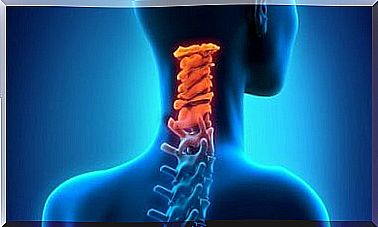Infant Colic: Causes And Tips For Parents
Infant colic causes strong screaming attacks in babies, which often lead to despair in the parents. The midwife Sara Cañamero gives some advice.

In addition to problems with sleep, nutrition, or breastfeeding, the main reasons for going to the doctor with an infant include infant colic. Today we are going to talk about the latter, as this problem often causes fear and confusion in parents.
The most common definition of infant colic is: episodes of intense, violent crying. These episodes last at least three hours a day, three days a week, and at least three weeks in a healthy, well-fed baby.
What do these seizures look like?
It is common for affected babies to assume a very typical position. They bend their thighs towards their stomach and clench their fists. At the same time, her face becomes noticeably red and her stomach is very tense.
These episodes can last anywhere from a few minutes to hours. In the times between seizures, the children are completely symptom-free and smile. They also eat well and gain weight normally.

Causes of Infant Colic
The causes of infant colic are multifactorial, which means there is no single cause that creates it. Often times, there are several predisposing factors that cause a particular child to suffer from this problem. These factors, according to this study, published in the Italian Journal of Pediatrics, may include:
- Organic: Immature digestive system, lactose intolerance, etc.
- Behavior: The baby’s temperament, behavior at home (with first-time parents), the type of breastfeeding and the use of the nipples, incorrect application.
- Anatomical: presence of a ligament of the tongue, changes in the palate, underweight.
What can you do?
First of all, for reassurance, we need to tell parents that this is a harmless condition for which there are no panaceas. The main thing is that you comfort your baby and always take care of his crying.
Just making her cry won’t get rid of colic. On the contrary, it can even lead to further complications on a physical and psychological level.
When your little one is crying, the first thing to do is to rule out the most obvious causes. For example, check to see if your baby is hungry, cold or warm, tired, needs a diaper change, etc. It is true that over time, parents will meet their baby’s needs for the way he cries , can recognize.
You also have to rule out a disease, such as ear or gum pain. To do this, it is important to see the pediatrician as soon as you realize that your baby may be in pain.
If your child is medically healthy, but you suspect that they are suffering from colic, then you should go to a specialist center with a multidisciplinary team.
What is colic counseling?
The colic counseling approach can be multidisciplinary. In this case, a midwife, a pediatric nurse, a physiotherapist and, if necessary, a psychologist come together for advice.
Generally, they start by analyzing the child’s birth, pregnancy, first few days of life, and family history. Then a physical exam is performed on the baby: abdomen, diaphragm, oral cavity, signs of atopic dermatitis, etc.
The same session also checks how the baby is being fed in order to rule out possible problems with breastfeeding. Often times, incorrect fitting can lead to the baby swallowing air.
Finally, treatment can also include physiotherapy or osteopathy. The specialist staff will also provide the parents with appropriate guidelines.

Guidelines for Parents on Feeding and Infant Colic
- When breastfeeding, you should avoid nipple shields and pacifiers, as these can cause nipple confusion. You should also allow your baby to drink for as long as they want – until they let go of their own accord. This is when you can switch to the other breast after your baby paves the way. Make sure that the donning technique is correct and that the baby does not have an annoying tongue frenulum. In other words, make sure your little one can move their tongue properly.
- If you are bottle feeding your baby, it is important that the technique is also correct and that your baby does not have any changes in the mouth. You can opt for an anti-colic bottle to regulate the milk flow and for low-lactose bottle food.
- After feeding, it is important to keep your baby in an upright position so that he can expel the collected air.
- Doctors can also provide nutritional advice to parents if they suspect the baby may have intolerance or allergies. To find out, you could, for example, avoid dairy products, gluten, eggs, nuts, soy or fish for two or three weeks. If the suspicion is confirmed, a nursing mother will have to restrict her diet slightly from now on. If this is not confirmed, she can take back into her diet all the foods she has given up.
More tips for parents
- An infant massage given by parents or caregivers can be helpful for the child. A physical therapist who specializes in infant colic can also perform the massage. While there is little scientific evidence that abdominal massage changes the digestive tract, there is evidence that it reduces crying and improves sleep and parents’ attitudes towards colic.
- Parents always have to take care of their crying baby.
- Research has shown that skin-to-skin contact makes babies cry less, as does carrying the baby ergonomically. This will keep the baby in the correct position and help them expel gases. Plus, being close to your baby will help you respond to their needs immediately.
- A slight elevation of the head in the cot is also a good recommendation to prevent infant colic.
When confronted with infant colic …
In summary, infant colic is a very common condition in babies under 4 months of age. In addition, they occur regardless of the type of breastfeeding.
While there is no specific cause, some guidelines can be followed to relieve symptoms and make the situation easier.
Even so, it is always best to consult a pediatrician for a diagnosis and treatment that is tailored to the case.









